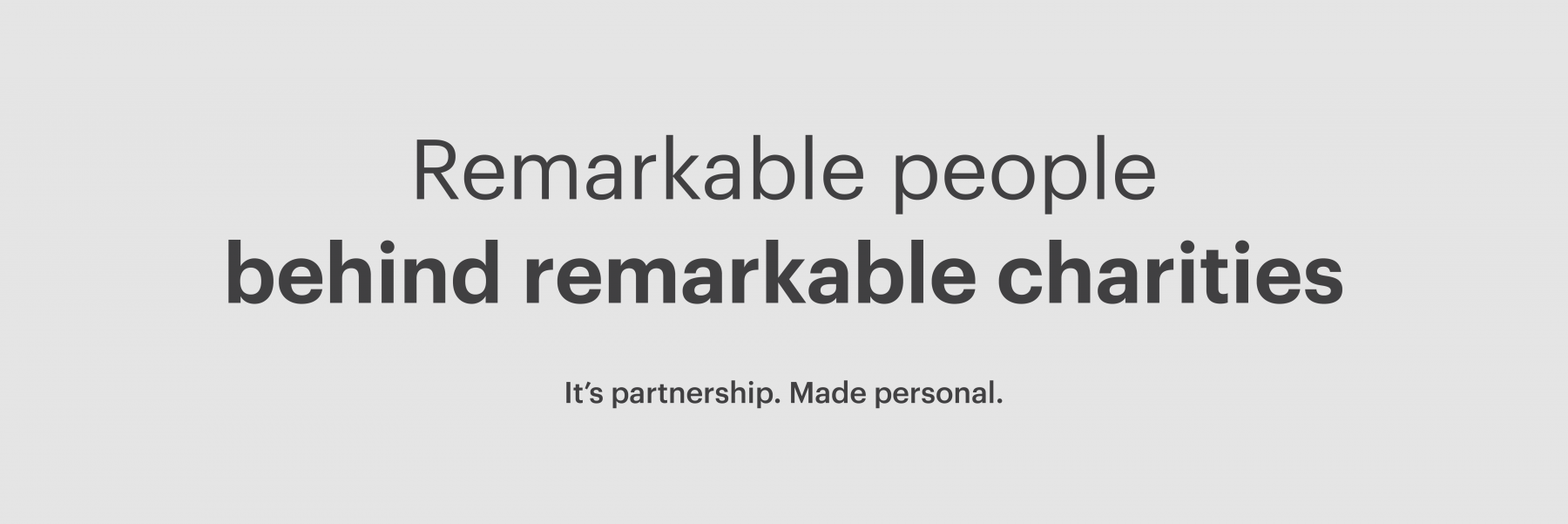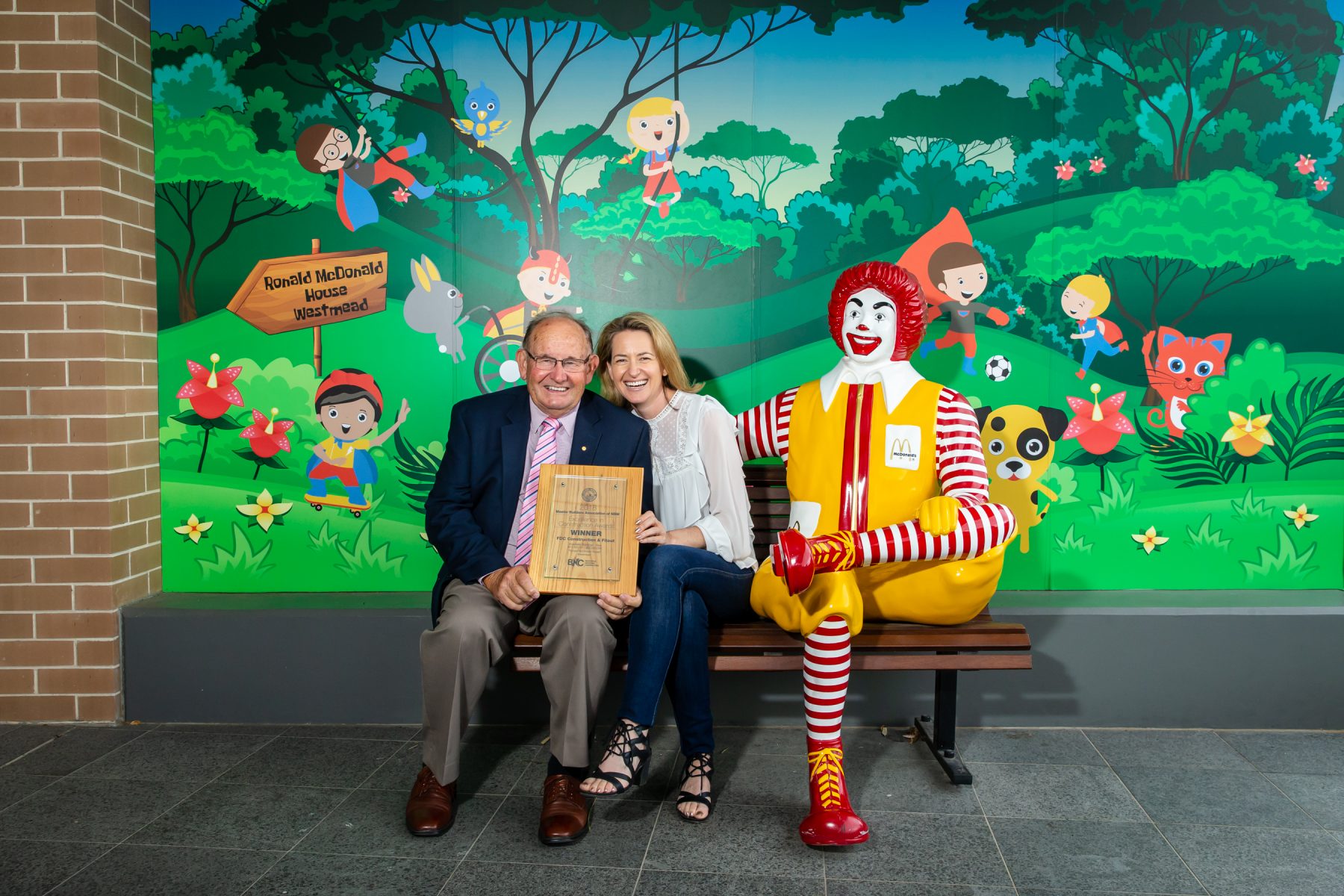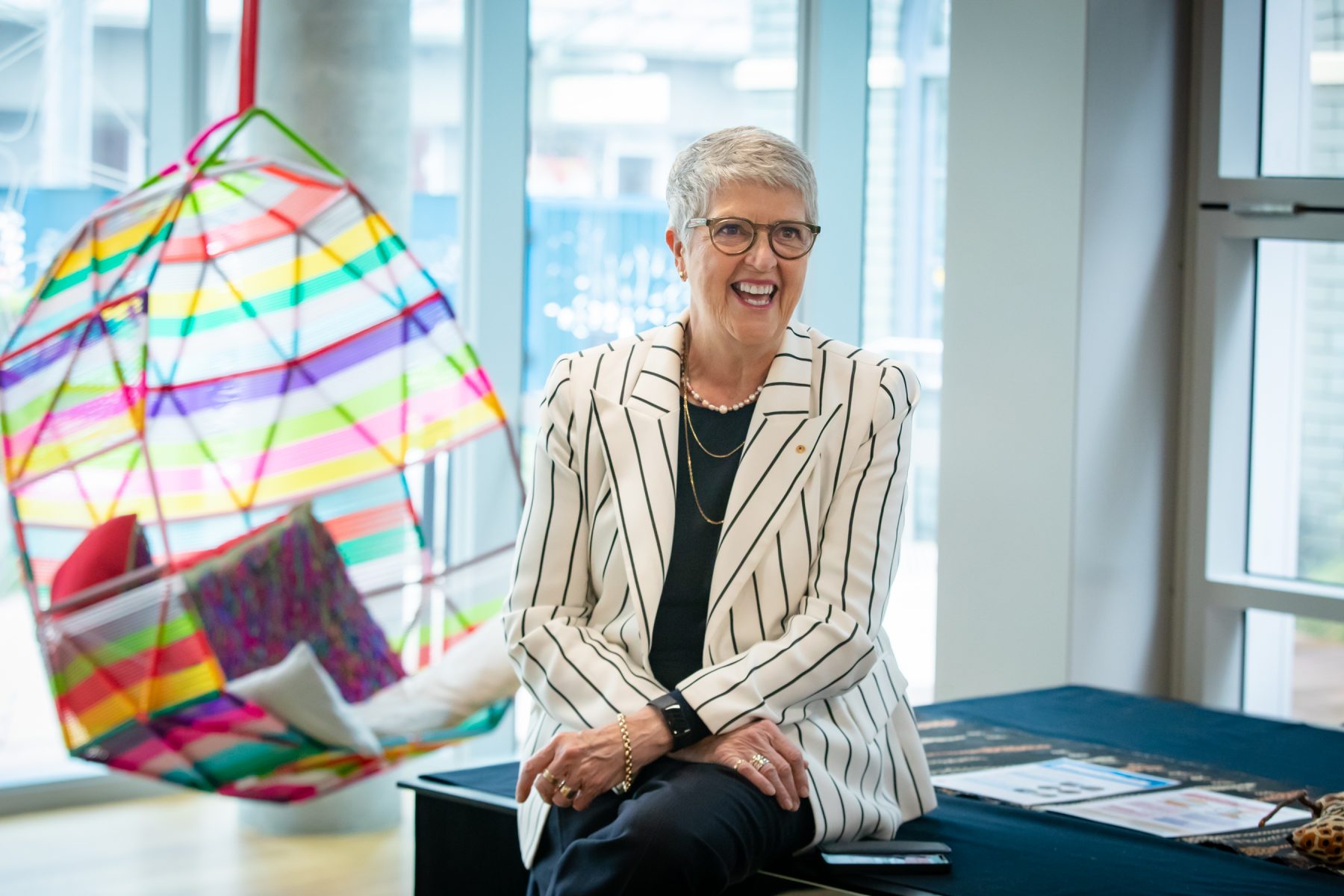

At FDC we are passionate about building remarkable partnerships with remarkable clients and
pride ourselves on our long associations with many of our clients. We are passionate about understanding their people, their story
and how together we can create a stronger and brighter Australia.
Read their stories below.

Ray Finn, OAM, is the Vice-Chairman of Ronald McDonald House, Greater Western Sydney. Ray coordinated the partnership with FDC on the construction of Ronald McDonald House in Westmead, providing accommodation for critically ill children and their families.
The idea of giving back is something I was aware of from a very young age. I had a great upbringing. My mum was honoured with life membership of the P&C Association, and she worked with the school long after we left. My dad was very involved with charities and clubs being a life member of Masonic Club. The importance of giving back was ingrained in me as a child and it gives me great joy and pride to have spent so many years now with Ronald McDonald House Charities
Working as Cabin Crew with Qantas for 22 years, in the late 70’s I was privileged to secure a London base where I lived with my wife Barbara and kids, Michael, Jacqui and Ian in Guildford, Surrey, in the UK flying to Bombay (now Mumbai) every week.
Crewing the second jumbo jet into Australia, and operating the evacuation flight out of Saigon, were just some of the highlights of my career, culminating in becoming a Line Manager for cabin crew South East Asia.
From burgers to the board
My first McDonalds store, as a licensee, was my local, in Castle Hill. I’d only been running it for three months when Guy Russo, who was the boss of McDonalds at the time, paid me a visit, “I’d like you to come and be the new licensee representative on the board of Ronald McDonald House,” he said. I could hardly believe it. “In the business sense, I’m struggling to do what I’m doing now, and you want me to go and be involved with this?” I asked. He said, “Yeah, I do. Come along next week and introduce yourself.” I did – it was March 1993 – and I’ve been on the board of Ronald McDonald House ever since.
The original Ronald McDonald House was Strathmore Cottage (built 1876) a beautiful old terrace on the corner of Ross Street and Pyrmont Bridge Road Glebe, just up from the hospital. It had eight rooms and a stable which was converted to a playroom. It was all pretty rickety. I walked into a crowded little old room in the hospital and the administrator put a set of plans down and said, “This is what we’re going to build at Westmead.” I knew nothing about the charity as such but had to dive straight in and assist in raising $2.4 million to build an 18-room house directly behind the new Children’s Hospital in Westmead. It’s an incredible charity. When you see it in action, it brings it home to you; the kids and their families, the relief of having somewhere to stay, the heartache and the pain of what they’re going through. I could tell you a thousand stories.
We keep a certain number of beds aside for kids from the Pacific Islands, and a few years ago, we were at the house playing Santa Claus when a bus turned up. It was full of Fijian men and women, who were travelling with their Church Choir. They came in, sat down and lifted everyone’s spirits with their beautiful singing. When they left, they said, “We apologise, all we have to give you is $1000.” I asked, “What’s that for?” And they said, “You looked after a child from our village. We wanted to thank you.” I get choked up just thinking about it. It was a beautiful moment, and there are so many of those. That’s what Ronald McDonald House is all about.
Friends in business
When it came to building the new house in Westmead, there was a reason FDC’s presentation for the tender stood out. It was their 25-year anniversary in business. We knew they had experience on their side, but there was also a commitment that went above and beyond. They didn’t just want to build for us, they wanted to know our story. Any charity knows how huge that is; there was a genuine care and compassion that I think is quite rare.
We ended up getting so much more than a business partnership. We were building a $38million-dollar facility, but FDC made it feel at times, like we were doing home renovations. We had meetings every week, and they were constantly analysing the project, changing aspects that they thought wouldn’t be quite right, actively looking for ways to save us money. The building was delivered on time and it came in just under budget. We have 60 rooms now and we went from being able to cater for 109 to sleeping 373.
Generosity starts at the top
The kids who were staying at Ronald McDonald House watched the building going up. If a crane was coming, one of the foreman would come over and say, ‘You might want to get the kids out,’ so the kids could enjoy the spectacle. These are very sick children and seeing how FDC’s people got so much from bringing them joy was wonderful. On Fridays we’d have a barbecue at the house, and the tradies and labourers would come over and cook for the kids and their families. That generosity starts at the top, and it filters all the way down.
There are people who worked on that site that still come back and do things for us, free of charge. The kindness of people is astounding. To be part of the FDC family is a wonderful thing. I never kid myself: we would not have achieved what we did without the compassion, caring and expertise that FDC brought to our project in “Keeping Families Close”.

Friend of FDC, Lindsay Cane AM, is the inimitable CEO of Royal Far West, bringing health and educational resources to vulnerable children in the country.
For as long as I can remember, my family was involved with Royal Far West. As kids, we used to have to share our Christmas presents with the kids from Far West. We were always very aware of the charity and what they did. We lived in Manly, but we always went to the bush for our school holidays. I loved being under the big skies out there, with the vast paddocks and the animals. I love working with rural families and communities. People who live in rural areas are typically proud, discreet and humble. They don’t ask for much and being resourceful, they can make a little bit go a very long way.
So how did I get to be at RFW? In 2010 I decided to take a break from my career as a
NFP CEO and non-executive director and go travelling. When I was in Germany in early 2011, learning to speak the language and dance the Argentine Tango, I got a call from Royal Far West asking if I’d consider coming back and “hold the fort” while they looked for their new CEO.
I came for three months and I’m still here after 9 years. Shortly after I arrived, I was faced with a decision: to close the charity and repurpose the assets, or bring it back to the thriving charity that it once was. I decided to stay on, and help transform Far West to its former glory. The mission was so clear and inspiring : healthy country children, and the fundamental belief by the founders that country kids should be able to be as well as any city child, was a compelling driver for me to invest my professional skills into the organisation.
Amplifying culture
In the ‘50s, ‘60s and ‘70s the Royal Far West site had been a polio hospital, and in 2011, there was still a feeling of it being run like an old hospital. I read the first 10 annual reports from the early years, 1924 to 1934, so I could truly understand what founder Stanley Drummond wanted to achieve. We introduced four new values which aligned with that: care, respect, integrity and energy. I wanted my people to deeply care about those we were meant to serve, to respect each other, respect our clients and operate with absolute integrity. I wanted to lift the energy of the place so it would feel vibrant and resilient.
Next, I looked at the service model that we were operating under. People had to leave their homes and travel to Manly if they wanted our help, which posed additional challenges. I pulled the staff together and said, “We have incredible expertise here and resources that you won’t find anywhere else in the country. Whatever we can do face to face, I want you to work out a way to put it on a technology platform. Rather than requiring all our families to always come to us in Manly, let’s see if we can turn this around so that we can go to our families, no matter where they live.”
Handshakes, not handouts
In Australia, there’s a measure of a child’s health called a vulnerability index, and kids in the bush can be five times more vulnerable than city kids on their health domains; physical health, psycho-social health, their ability to communicate, their language skills, and their fine and gross motor coordination skills. Vulnerable country kids who don’t get early interventions because there are no local services, risk growing up to be vulnerable rural adults, which is detrimental to all Australians. When rural Australia is strong and vibrant and resilient, then the whole nation has a much better chance of being the same.
I was also mindful that charities are often perceived as wanting handouts rather than being good business partners. Royal Far West had such a proud and noble history, I wanted it to be understood as a committed partner who was looking for a “handshake” with our funders and supporters rather than a “handout”. Talking in terms of handshakes, not handouts is a powerful statement of how our charity operates.
We also talk frequently about friendraising rather than fundraising. It’s my view that a charity that’s based on strong, respectful relationships is going to thrive. Relation ships are at the core of how we operate. My concept of friendraising is that friends look after each other. They have coffee together, they talk together and they share interests and mutual respect. Your friends might have funds to donate, or they can give time to help, or offer their intellectual resources. Our charity is enriched by people giving what they can, in the way that suits them. Ive always found that when you run a good business, people want to be aligned with you, so we do our best to be a high integrity, relationship-focused charity that attracts and nurtures good friends.
Construction companions
FDC is one of our very early friends. I distinctly remember the first time FDC made my heart sing. Con [Cornelius Hart] rang me out of the blue to ask if I was interested in a donation of some furniture, from a fitout they were working on. It was beautiful furniture that was delivered without any conditions, just a desire to help the charity. In subsequent years they have delivered Christmas presents to the kids, which have been unbelievably gorgeous. In 2014, FDC came up with the idea of fundraising for us, via a charity bike ride, which they’ve done every year, for the last six years. They’re major sponsors of the ride and they’ve become valued friends over the years. They also bring an incredible energy and love for the charity.
When we were ready to tender for the construction contract of our headquarters in Manly in 2016, I recommended to my Board that rather than tender it, FDC would be my preferred supplier, and I wanted them to do the work. I was confident in their ability to deliver and I was confident that I could trust the professional relationship that we had built. They were great partners to do the build with and it was fun having the boys on site. Chris Bignall was our site foreman, and the most terrific man. He became a cult figure in Manly; the locals, and local businesses got to know him and adored him. He brought the community together.
Everyone on site, from the lollipop/ traffic people to the crane drivers, were well-briefed to be advocates for the charity and support the local community to understand what we were doing with the redevelopment. They smiled and talked to the local residents. We anticipated anything that might be difficult for the community and we tried to stay 10 steps ahead of them. It was wonderful.
Since completing the build two years ago, FDC has remained connected to our charity and we remain firm friends. They’re true advocates for our sector and I’m proud to be associated with them. They do more than build buildings. They help to build a better society.